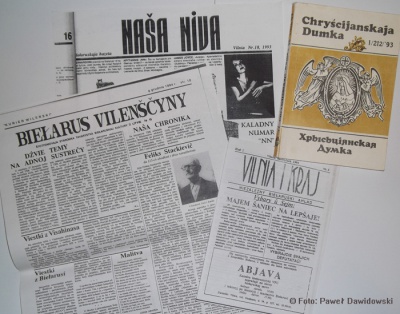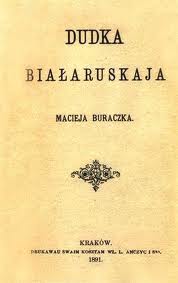Belarusian Ultras and the Regime

Recent successes of football club BATE Barysau in the Champion League caught attention not only of supporters from all over the Europe but also of the Belarusian authorities. Achievements of FC BATE often appear in public speeches of Lukashenka.
Answering the question from FC BATE forward Vitaly Radzionau on his last press-conference on January 15, Lukashenka said that FC BATE should be grateful to him because he freed football club form taxes.
Despite the fact that during the last press conference Lukashenka said that he always played football last time he played football in public long was time ago. The favourite sport of Lukashenka is ice hockey. Perhaps for that reason football stadiums are not being built in Belarus and the sports gets little public support.
Victories of the small Belarusian football club in Champion League occurred not because but despite the state policy in the field of sport where football has a low priority. Football in Belarus is an unprofitable business. Belarusian football clubs have a modest financial backing and have permanent financial problems. This is why many good players prefer to pursue a career not in Belarus but in Kazakhstan or in minor leagues in Russia.
Owners of football clubs are enterprise managers from state sector, representatives of regional political elites and oligarchs from the encirclement of Lukashenka. That is very similar to the football management in USSR.
At the same time the subculture of ultras and football hooligans in Belarus is on the rise, which creates a nuisance for the Belarusian authorities. In a country where most areas of public life are under governmental control football fans represent a group which has a protest potential.
Ice Hokey versus Football
After Lukashenka came to power in Belarus ice hockey became the main sport in the country. In the end of 1990s and during 2000s around 30 “ice palaces” were built all around the country. Funds for building the arenas were taken from the state budget. Nowadays around 20 more ice arenas are planning to be built.
The most expensive project of Belarusian ice hockey is the ice hockey club Dynamo-Minsk, which is playing in the Continental Hockey League (KHL). Its annual budget in 2011 amounted $24 millions. The annual budget of FC BATE in 2012 was estimated at only $8 millions.
In the meanwhile, the infrastructure of football in Belarus is poor. New stadiums are not being built (with exception of a new stadium of FC BATE which is currently under construction). There is not even one stadium in Belarus which in accordance with the criteria of UEFA is fit for matches on group stages and playoffs of European cups. The main football arena of Belarus is Dynamo which has only 34 thousands seats closed for renovation in 2012.
The Structure of Belarusian Football
Following Soviet traditions of the USSR, Belarusian state is the main customer and supervisor of professional sport. Lukashenka is the Head of the National Olympic Committee. Functionaries of the government, heads of security structures, and business elites from the circle of Lukashenka also serve as heads of sports federations.
Chief executives of football clubs are also recruited from the regional political elites and managers of state businesses. Sponsorship of football clubs is carrying out by municipalities and regional budgets, by state enterprises and business.
For example the chief executive of FC BATE Anatoliy Kapski is the director of BATE industrial plant which produce starters for tractors. The chairman of the supervisory board of another well-known Belarusian football club FC Dynamo Minsk is one of the wealthiest men in Belarus Yury Chyzh nicknamed by journalists “Lukashenka's wallet”. Currently Yury Chyzh in on the EU travel ban list because of alleged support of the Belarusian regime.
The most notable exception to the rule when the typical owner of Belarusian football club is an administrator from Belarusian ruling elite is Lithuanian businessman Vladimir Romanov – the owner of Heart of Midlothian F.C., FBK Kaunas and BC Žalgiris.
In 2000s he invested into FC MTZ-RIPO Minsk (later on FC Partisan). However, in 2011 after Minsk authorities refused to sign the investment agreement on the construction of the stadium with Romanov Romanov stopped the sponsorship of the football club.
Poor funding, old and dysfunctional stadiums, failure in the European cups of most of Belarusian football clubs contribute to low attendance of national championship. Moreover, Belarusian stadiums have a very poor infrastructure: no food is sold, beer drinking and smoking is completely prohibited.
Supporters often have to endure long humiliating procedure of security checks performed by ordinary and riot police. As a result average attendance of the highest league of Belarusian football championship is 2,000 people per match. A big part of these supporters belongs to ultras and football hooligans’ subculture.
Being Ultras in Belarus
After the Soviet Union collapsed in Belarus, similarly to others countries of ex-USSR, ultras and football hooligans subculture became widespread and has evolved over the 1990s and 2000s. Nowadays in Belarus there are two widest warring groups of fans. The first group is Dynamo Minsk Ultras famous by their right-wing political views.
The second group is FC Partisan Minsk (ex FC MTZ-RIPO) fans. After Vladimir Romanov stopped sponsorship of FC Partisan fans revived the club. Last season FC Partisan played in the Minsk championship. Most of FC Partisan supporters are leftists and describe themselves as anti-fascists.
ultras cannot hang banners in English for the reason that police cannot understand the text Read more
The conflict between Belarusian police and ultras is permanent. Most Belarusian cities apply absurd stadium regulations during the games. For instance, ultras cannot hang banners in English for the reason that police cannot understand the text. Police hinders fans from travelling in order to see matches. Usually police stops fans on railway stations and detains them until the match begins. In consequence ultras arrive for the match with a long delay.
In recent years on several occasions riot police attacked ultras on the stadium without any reason. For example, in the summer of 2011 in Babruisk during the match between Belshina Babruisk and Dynamo Minsk riot police attacked guest ultras using tear gas during celebration of the goal scored by Dynamo. As a result several fans, a five year old child and a Dynamo Minsk player who run up to the sector with a guest fans to celebrate the goal were injured.
Provoked by the riot police Dynamo Minsk ultras chanted the slogan “We hate the regime” for several minutes, referring to the political regime in the country.
The conflicts between ultras and Belarus Football Federation are often initiated by Federation officials. The latest conflict took place in the autumn of 2012 after the ticket prices for the World Cup qualifying match against Spain increased 10 times in comparison to another official matches. Prices for the tickets for the match against Spain amounted from $25 to $42 while the price for the tickets to the previous official match against Bosnia and Herzegovina on September 2, 2011 according to the official exchange rate were around $5.
To make the Federation reduce the prices members of the ultras group of Belarus representation B-12 announced the boycott of the match, resulting with extremely poor ticket sales for the game. In order to fill the stadium, employees of state-owned enterprises and schools were forced by their supervisors to buy the tickets.
Belarusian Ultras and the Regime
Because of total control on the stadiums, Belarusian Ultras rarely express their political views towards Belarusian political regime. But they are doing it outside stadiums or during the matches that take place outside the country.
In the summer of 2011 during the silent protest actions in Belarusian cities in independent mass-media appeared the information that just before one of the action was arrested one of the leaders of FC Dynamo Minsk fans Anatoly Khamenka one of active participant of such actions.
The same days to support the protesters FC BATE ultras on the away match in Panevėžys (Lithuania) chanted the slogan ШОС [shos] which can be decoded as “May he die!” which refers to Lukashenka.
On the away matches of Belarus representation most of the fans use the White-Red-White flag which was the official flag of Belarus before 1995. Forbidden in today’s Belarus it is using by opposition.
In Lukashenka's Belarus state is using security agencies seeks to control every political and social activity. The subculture of ultras and football hooligans can be seen by youngsters as an attractive alternative for self-realisation.
Numerous and well-organised groups of ultras is seeing by security services as a threat to the authoritarian regime. That is why using riot police during matches and making unbearable conditions for active support they try to reduce the protest potential of the ultras.






